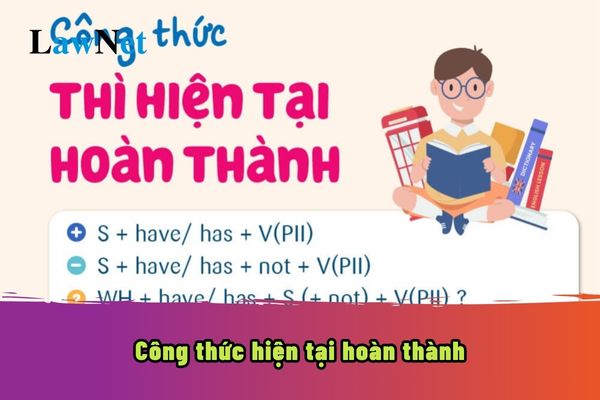Vietnam: What are the present perfect formulas and examples thereof?
What are the present perfect formulas and examples thereof?
Students can refer to the present perfect formula as follows:
|
What are the present perfect formulas and examples thereof? The present perfect tense is used to describe an action that occurred in the past, continues to the present, and may continue into the future.
|
*Note: Information is for reference only./.

What are the present perfect formulas and examples thereof? (Image from the Internet)
What are the required skills for students in Vietnam after completing the English curricula at the lower secondary level?
Under Section 3 of the Appendix issued with Circular 32/2018/TT-BGDDT on the English curricula from grades 3-12, the required skills for students in Vietnam after completing the English curricula at the lower secondary level include:
[1] Use English as a communicative tool through four skills: listening, speaking, reading, and writing to meet basic direct communication needs in familiar and everyday situations.
[2] Have a basic understanding of English, including phonetics, vocabulary, grammar; through English, have a general understanding of the country, people, and culture of English-speaking countries and other countries worldwide, while also having an understanding and pride in the values of their national culture.
[3] Have a positive attitude towards the subject and learning English, initially knowing how to use English to explore other subjects within the general education program.
[4] Develop and apply different learning methods and strategies to improve communication skills in English both inside and outside the classroom, manage study time, and foster a habit of self-study.
- Content reflects the author's perspective on life and people.
Is using English to improve the learning quality for other subjects one of the objectives of the English curricula in Vietnam?
Under Section 3 of the General Education Program for English issued with Circular 32/2018/TT-BGDDT:
OBJECTIVES
...
2.3. Upper secondary education
After completing the English curricula the upper secondary level, students must be able to:
- Use English as a communicative tool through four skills: listening, speaking, reading, and writing to meet the basic, practical communication needs on familiar topics related to school, leisure activities, entertainment, careers, ...
- Continue to form and develop basic knowledge of English, including phonetics, vocabulary, grammar; Through English, have a deeper understanding of the country, people, and culture of English-speaking countries **** and other countries worldwide, understand and respect cultural diversity, while initially reflecting the value of Vietnamese culture in English.
- Use English to improve the quality of learning in other subjects within the general education program.
- Use English to pursue higher learning objectives or be able to work immediately after high school.
- Apply various learning methods to manage study time, apply information technology in study and self-study, strengthen self-learning methods, self-assessment, and take responsibility for learning outcomes, fostering a lifelong learning habit.
Thus, according to the above regulations, using English to improve the learning quality for other subjects is one of the objectives of the English curricula in Vietnam.

